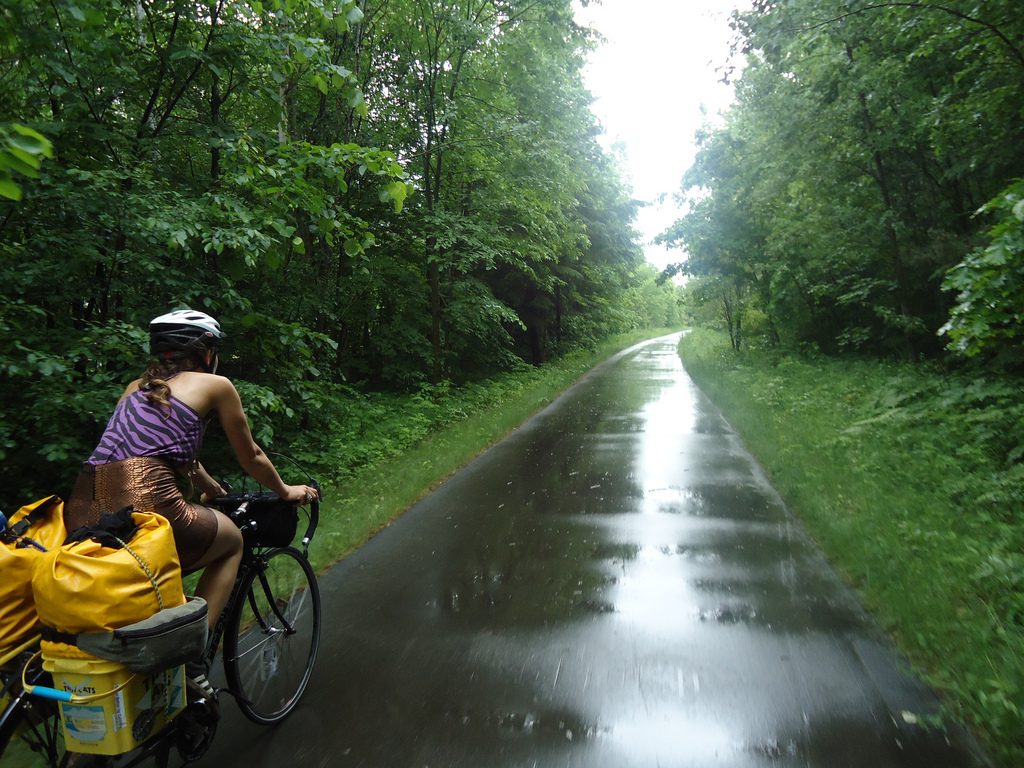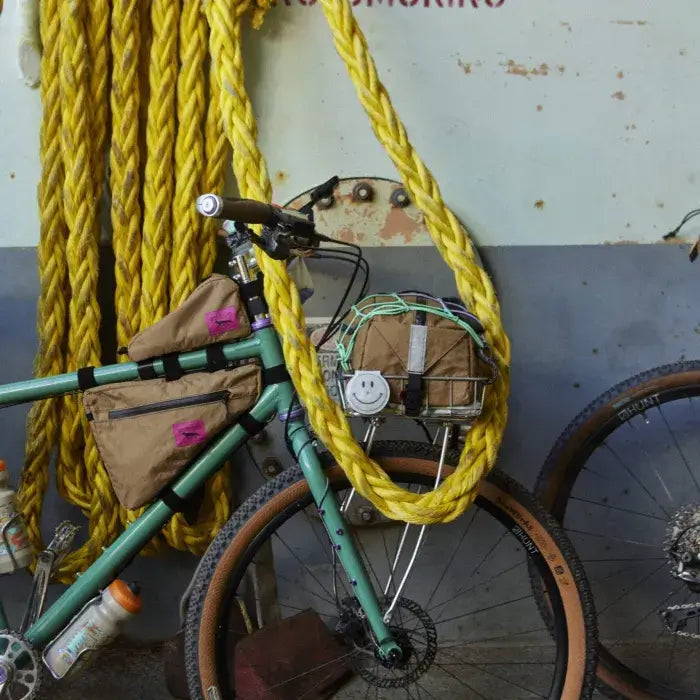Tough & Tender: flaming wheeled glory - Swift Industries
Share

People ask if the trip was good. They mean it — they’re genuinely interested. They want to relate, to understand. And so they ask questions about how many miles we rode a day, how much weight we carried, what we ate, the toughest mountain pass. Sure, they’re legitimate questions. But how do you tell Average Guy that the physical aspect of riding your bicycle across the United States really wasn’t the most challenging part? Everything in Average Guy’s cultural repertoire goes against this. He wants to place you in the same camp as Lance Armstrong, the Race Across America crazies, and his aunt (who does triathlons for cancer). He wants to hear about the sweat and the tears, and about how buff your ass must be. He, like most of mainstream America, is focused on the “extreme” aspect of any athletic enterprise. He is invested in Survivorman mentality, where only winners and winning experiences are valuable. Sure, the protagonist goes through trials and overcomes dangerous pitfalls, but he (it is always a he) always gets his man (or more often, his woman). And the story is worth being told only because there is a happy ending.
We stood astride our bikes at the base of Trail Ridge Pass, elev. 12,000 ft., knowing that we’d be climbing for almost 30 miles, and the better part of four hours. Knowing that at least one of us had serious issues with altitude sickness, and knowing that we’d have to melt snow along the way for water. And as we climbed along slowly, panting in the oxygen-thin morning air, cars and Harleys whizzed past on the no-shoulder road. We took particular note of the faces of those coming toward us. The man, driving the diesel truck with a stern, annoyed expression. And the woman, always in the passenger seat, often shaking her head with her mouth agape, as if to say “no way, those idiots will never make it.”
We received virtually no encouragement, not even from the roadies who whizzed downhill weightlessly, encumbered only by their power gel and electrolyte water. Hours later we approached the summit, riding in the shadow of 12-foot snow banks. Treeless tundra with a 360-degree view of the Rocky Mountains. Tourists packed in gargantuan RVs as far as the eye could see. They crowded the “gift shop” at the top to buy bobbles proving they were there, and coffees to “warm up.” They took photos of our laden bicycles without speaking to us, as if we were the wildlife. We took heart in this. The wildlife.
Only as we came to the precipice did we begin to receive encouragement. Drivers, pulled to the sides of the road to take photos, honked their horns and let out loud whoops. Now we were winners. Now tourists watched proudly as we glided up and down the rolling peaks of the ridge, hollering breathlessly, tears running down our faces. And then it was over.
I wanted to tell the families on the side of the road that it didn’t matter if we got to the top. And it didn’t matter if we made it across the country. It mattered that we had the guts to try it knowing that we could fail. It mattered that we worked and deserved to get here. I wanted to tell them that most of the time things weren’t this glamorous. That there were falls and scrapes and disagreements and sticky situations. I wanted to tell them that those things mattered more than being at the top of any mountain.
Throughout the journey, strangers we met would say “What cause are you doing this for?” or “I wish I’d done something like that when I was a kid.” I began to understand why Survivorman mentality is so appealing to so many Americans. From our ultra-convenient temperature-controlled confines, we watch and obsess about movies like 127 hours or Into Thin Air, mentally placing ourselves in the protagonist’s shoes, trying to get a glimpse of what we might do if pushed to the limit. But the very nature of our comfortable, convenient lifestyles means that we will likely never get this chance. Excuse me — we will never create this chance for ourselves. I began to feel desperately sorry for the hordes of apathetic youth (and adults) in this country. I wanted them to feel this feeling. To be forced to confront yourself, your physical ability, your skill set, your personality flaws, your portrayal and assumptions of who you are and what that means on a daily basis. I want to tell Average Guy that the real bugger of a long bike trip is trying to re-enter society while undertaking a complete reassessment of your life, your priorities, relationships, doubts, fears, desires. I want him to understand how hard it is to wrench yourself from this world of self-sustained struggle only to sit in an airport and watch people utilize the plastic cutlery dispenser, preventing them from sharing unwanted germs with others.
I want him to know that a long, two-wheeled vision quest will teach a person to learn to love it here, wherever here is, even though the “real” world is bound to strike you as absurdly petty and divided after what you’ve been through. After poor strangers have opened their homes to you, given you a cup of coffee, the best directions, everything they have, or just a smile.
–Cat, Bellingham WA



Tough and Tender is a compilation of photos and essays contributed by female cyclists from all around. Cycle Swift called for artistic submissions to celebrate women in bicycle culture. Stay tuned through August as we highlight contributors throughout the month.

